Why Downsizing Your Backyard Pool Can Boost Property Value: Key Benefits Explained
When it comes to real estate, homeowners are always looking for ways to increase property value. Surprisingly, downsizing your backyard pool can be a smart move. A smaller pool can make your property more appealing to potential buyers. This change might lead to a better sale price and quicker offers.
Large pools often require more maintenance and can be expensive to keep up. By reducing the size, homeowners might lower these costs and open up space for other outdoor improvements. This can attract families looking for a balance between pool fun and outdoor play areas.
Many buyers today prefer homes with versatile outdoor spaces. By downsizing the pool, homeowners can offer a more adaptable backyard. This shift can be a strong selling point in the competitive real estate market.
The Impact of Pool Size on Real Estate Value
Downsizing a pool can positively affect property value by aligning with market trends and appealing to potential buyers. Understanding how pool size fits into the real estate landscape helps homeowners make informed decisions.
Understanding Real Estate Market Trends
The real estate market constantly shifts, influenced by buyer preferences and economic conditions. Pools were once a major luxury, but now, more buyers prefer manageable outdoor spaces. Larger pools mean higher upkeep, which can deter some buyers.
Today’s market trends emphasize low-maintenance living. Homeowners and real estate agents recognize that a smaller pool aligns with these preferences. This shift impacts property value, as homes with oversized pools may not attract as many offers.
Comparative Property Value Analysis
When comparing properties, pool size can tip the scale in terms of value. A large pool may suggest higher maintenance costs, affecting a home’s appeal. Buyers might see an oversized pool as a liability rather than an asset.
Smaller pools often add to a home’s charm without imposing extra burden. A well-sized pool can increase resale value, as many buyers prefer a more balanced outdoor space. This balance can make a home more appealing without compromising property value.
How Pool Size Influences Potential Buyers
Potential buyers often look for homes that fit their lifestyle. While a pool is attractive, the size can greatly influence their interest. Smaller pools might be seen as more accessible and easier to maintain, drawing more buyers.
Real estate agents often find it easier to market homes with right-sized pools. These homes can cater to buyers who enjoy swimming without the hassles of an overly large pool. Smaller pools can enhance home value by ensuring the property appeals to a broader audience.
Financial Considerations for Downsizing Your Pool
Downsizing your pool can lower maintenance costs and boost your property’s equity. This decision can save money on ongoing expenses and potentially provide a solid return on investment.
Maintenance Costs and Savings
A smaller pool significantly reduces maintenance costs. Chemicals, cleaning, and repair expenses drop. Less water means fewer pool chemicals, which can add up to substantial savings annually. Smaller pools are easier and cheaper to clean, requiring fewer equipment repairs.
Electricity consumption also decreases, as smaller pumps and heaters use less power. These savings can cut monthly energy bills.
By investing in a smaller pool, homeowners can allocate their funds to other home improvements. Upgraded patios, gardens, or outdoor kitchens enhance their home’s overall appeal.
Return on Investment Expectations
Downsizing a pool can increase return on investment (ROI). A smaller pool makes the backyard easier to maintain and leaves more space for other desirable features. Outdoor spaces that are versatile and low-maintenance often attract potential buyers.
The cost of downsizing must be balanced with potential gains. Although it involves initial spending, this change can increase property value. A smaller, efficient pool can appeal to a broader range of buyers, especially those seeking practical outdoor areas.
In real estate, well-planned home improvements generally boost both property value and equity. Homeowners should consider how these changes align with their financial goals.
Optimizing Your Outdoor Space
Optimizing an outdoor area can lead to more functional and enjoyable spaces. By focusing on smart landscaping and improving entertainment zones, homeowners can maximize the potential of their backyard.
Strategic Landscaping After Pool Downsizing
Strategic landscaping can make a downsized pool seem intentional and well-integrated. Planting shrubs and flower beds around the pool area can enhance its appearance and add privacy. Using native plants reduces maintenance and water use, creating a sustainable environment.
A mix of paths and open lawn areas improves access and usability. Walkways crafted from stone or brick can lead to and from the pool, tying the space together. Well-placed lighting highlights garden features and ensures safety. Trees provide shade and enhance the visual appeal.
Enhancing Outdoor Living and Entertaining
After reducing the pool size, the additional space can be transformed into useful outdoor living areas. Patios or decks can open up new possibilities for relaxation and gatherings. Durable outdoor furniture such as weather-resistant chairs, tables, and sofas ensure comfort and style.
Installing a grill or outdoor kitchen turns the area into a hub for entertaining. String lights or lanterns offer ambiance at night. Fire pits serve as a focal point, providing warmth and a gathering spot. These additions make the backyard more inviting for family and friends, enhancing outdoor living experiences.
Safety and Liability Considerations
Downsizing a backyard pool can address important safety and liability issues. Smaller pools are often easier to safeguard, thereby minimizing risks to children and pets. Simplifying pool features can also make liability coverage more straightforward, which may appeal to potential homebuyers.
Reducing Safety Hazards
Smaller pools can lessen safety concerns by being easier to monitor. Use locked gates and install proper fencing to keep children and pets safe. Less surface area means fewer spots for accidents like slips and falls. Scarlett Johnson, a safety expert, notes that compact pools often require fewer resources to maintain safer conditions.
Alarms and covers are also effective tools for enhancing safety. They act as preventive measures against accidental drowning. A well-designed pool cover can be particularly useful in preventing accidental access by children and animals. It’s a straightforward step to create a much safer environment.
Balancing Safety and Enjoyment
While safety is crucial, enjoyment shouldn’t be overlooked. Smaller pools can still provide plenty of fun without compromising safety and security. For instance, reduced depth makes it safer for all ages to enjoy the water.
Sleek designs often come with features like graded entry that blend safety and use. This can boost a home’s charm while keeping risks at bay. Potential homebuyers value this feature since it combines aesthetics with security. It’s a balance that works as an attraction for families seeking homes with pools.
Climatic and Location Factors
Downsizing a backyard pool can be influenced by climate and where you live. Different climates affect how often pools are used and how they are maintained. Location also plays a role in deciding the best pool size, especially in high-end neighborhoods.
Climate Impact on Pool Usage and Maintenance
The climate affects how often a pool is used. In warmer climates, pools see more use. They offer a great spot to cool down. This can make larger pools attractive.
Maintenance is a concern in regions with drastic weather changes. Cold climates may require extra care. Winterizing procedures can raise maintenance costs. In warm areas, pool water can evaporate quickly, increasing water bills.
Smaller pools can be less costly to maintain. They require less water and chemicals. In both hot and cold climates, a smaller pool can save money on upkeep.
Location-Based Decisions in Pool Sizing
Location also affects pool size choice. A high-end neighborhood might favor larger, fancier in-ground pools. This aligns with the area’s aesthetic and property value.
In contrast, neighborhoods where space is tight might benefit more from smaller pools or above-ground options. A smaller pool can offer a greater balance of functionality and yard space.
Local trends play a role too. Areas with many young families might prefer smaller pools which are safer for children. Proximity to recreational water bodies can reduce the need for a larger personal pool.
Design and Aesthetics
Transforming a backyard with a smaller, thoughtfully designed pool can enhance both beauty and function. Maximizing the charm and appeal of these spaces involves innovative designs and aesthetic touches.
Innovative Design for Smaller Pools
Small pools can feel spacious with creative layouts. Building an in-ground or above-ground pool with clean lines keeps it looking modern. Homeowners often opt for L-shaped or rectangular designs as they make efficient use of space.
Utilizing multi-functional designs, such as integrating seating ledges, adds value. Smart placement with strategic landscaping enhances privacy and usability. Natural stones or eco-friendly materials lend an elegant, timeless look.
Using glass or transparent elements can create an illusion of space. Consider perimeter overflows; they make the area look luxurious while being practical.
Aesthetic Enhancements and Features
Aesthetic upgrades can make small pools attractive. LED lighting systems around the pool area provide mood lighting for nighttime swims, while solar lights save energy. Water features like fountains or small waterfalls bring a sense of tranquility.
Incorporating texture with materials like mosaic tiles or polished concrete gives a premium feel. Landscaping with native plants ensures sustainability and visual appeal. An outdoor seating area with stylish furniture encourages social gatherings.
A stylish deck or patio compliments the pool, using durable materials like composite wood. It seamlessly connects with the rest of the backyard, making the area a cohesive retreat. By adding personal touches that highlight natural elements, the pool becomes more than just a water feature—it’s an inviting part of the home.
Consulting with Real Estate Experts
Downsizing a backyard pool can potentially increase property value. Engaging with real estate professionals can provide key insights into how this change might affect a home’s marketability and resale value.
The Role of Real Estate Agents in Valuation
Real estate agents play a crucial role in determining home value, especially in high-end neighborhoods. They assess how features like pool size impact property appeal. Their knowledge of local markets helps homeowners understand how modifications meet buyer preferences.
Agents often compare homes with similar features to gauge the best listing price. This includes examining recently sold properties to estimate how changes, like adjusting a pool size, may boost home value. Their experience provides confidence in making informed decisions.
Market Insights from Industry Professionals
Professionals in the real estate market offer valuable market insights regarding property modifications. They understand that trends can differ greatly from one area to another, especially in high-demand neighborhoods.
These industry experts monitor buyer trends and neighborhood preferences, which helps homeowners decide how changes will appeal to potential buyers. Their expertise highlights how downsizing a pool may offer unique advantages in boosting resale value. Exploring such options can be beneficial, and seeking expert advice can ensure a well-informed approach to backyard transformations.
For those considering removing a pool entirely, trusted pool removal experts can provide guidance and services to facilitate this transition.

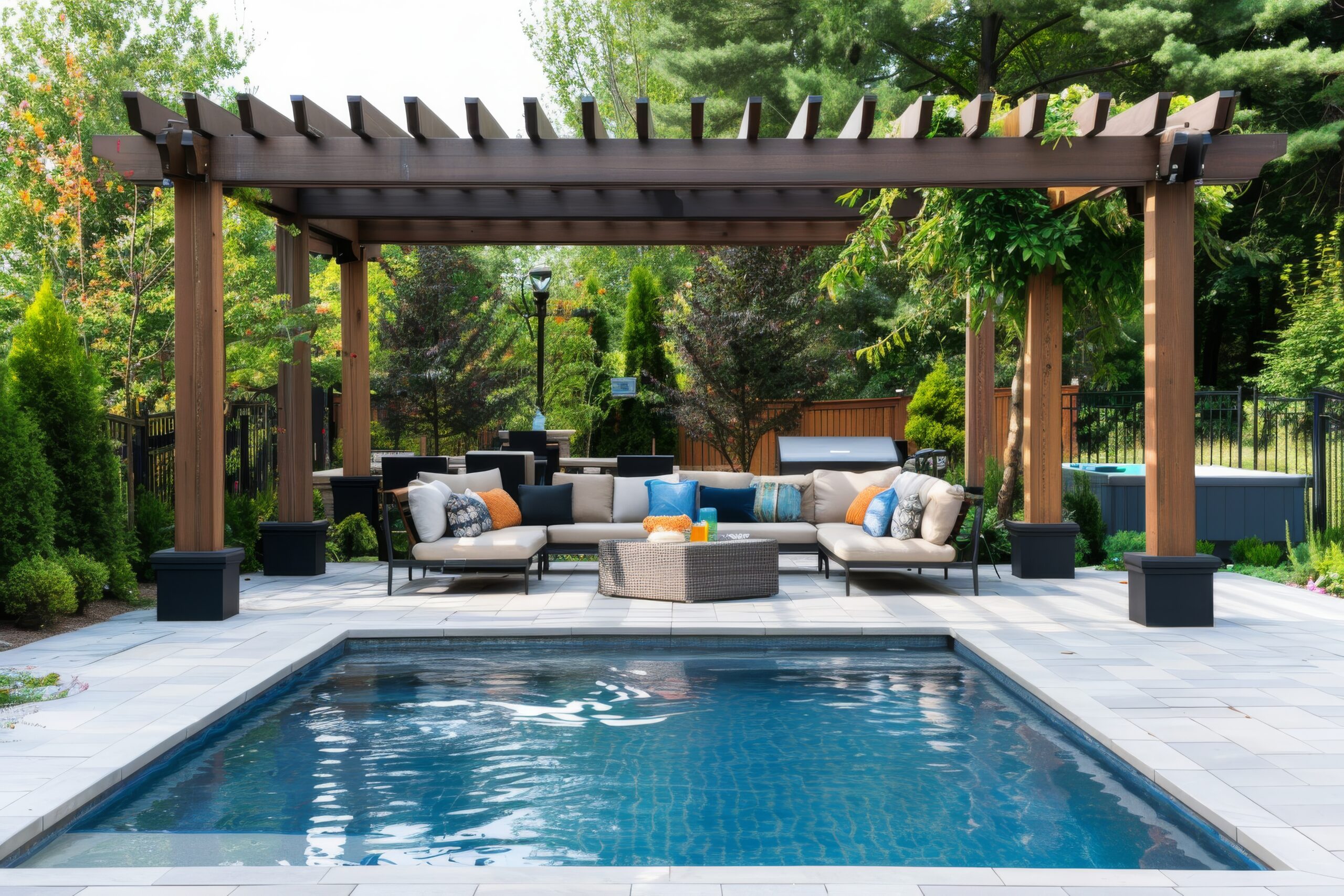
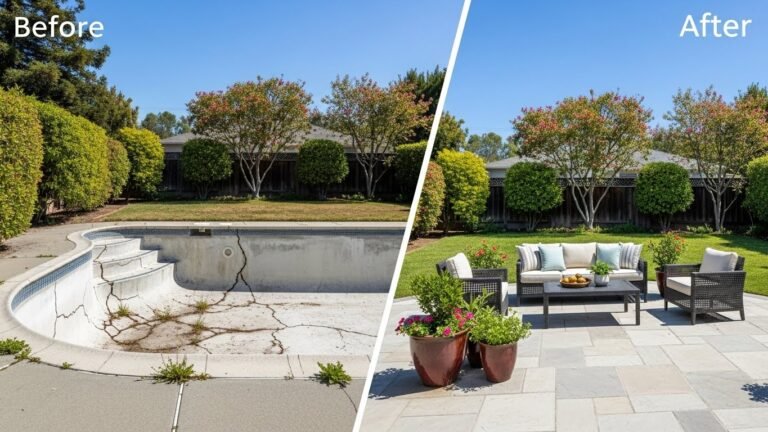
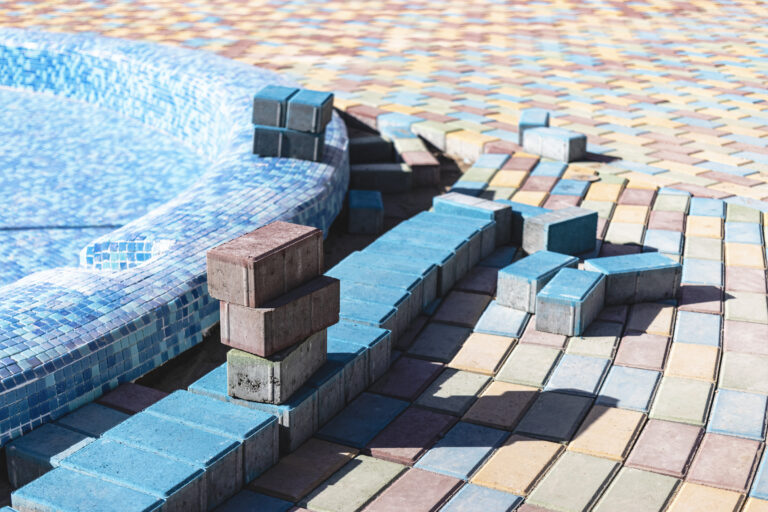
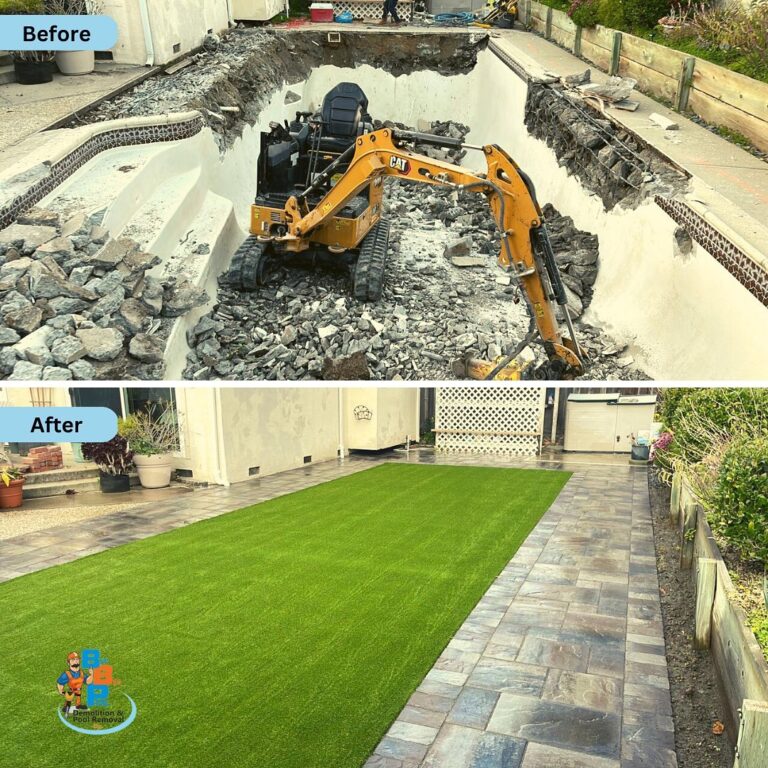
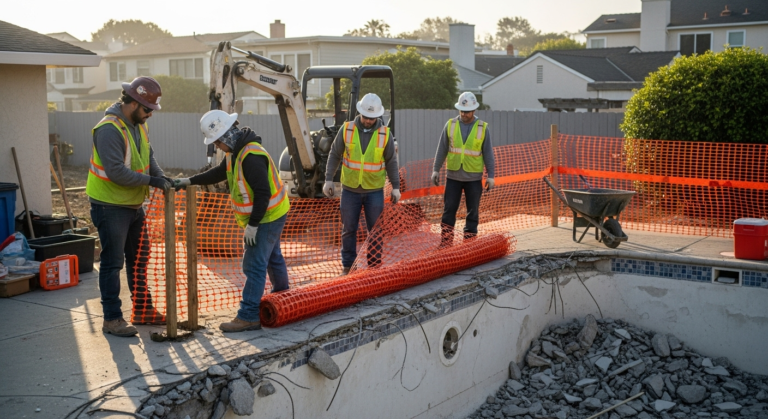
![7 Powerful Steps to Prepare for a Successful Pool Demolition Project in California [Checklist]](https://byebyepools.com/wp-content/uploads/2025/04/7-Powerful-Steps-to-Prepare-for-a-Successful-Pool-Demolition--768x512.jpg)
